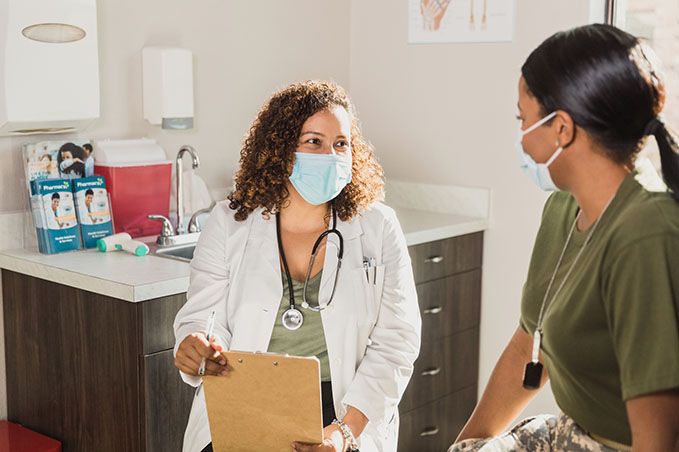From the Mummers Parade to her Inspira care team, Christina Camuccio found strength in every note of...
Read MoreEffective Monday, January 5th, Inspira Health is now at Yellow Alert Status: Masks for staff, patients and visitors in all high-risk areas across our facilities are strongly recommended.


Each year, over 100,000 people are diagnosed with gynecologic cancer—cancer affecting the cervix, ovaries, uterus, fallopian tubes, vagina or vulva. While gynecologic cancers are treatable, their symptoms can be subtle, resulting in more late-stage diagnoses, especially for those who don’t get regular screenings.
It’s important for providers to know what to look out for and how to talk to their patients about the importance of early cancer detection. To help answer some of the most frequently asked questions from providers, we spoke with Lauren Krill, M.D., a gynecologic oncologist at Inspira Medical Center Vineland.
What gynecologic cancer warning signs should we look out for when seeing patients for routine visits?
Dr. Krill: The most concerning signs commonly include post-menopausal bleeding and persistent, non-specific gastrointestinal symptoms such as decreased appetite, bloating or distention. Gynecologic cancers are tricky because the symptoms can be very subtle, and many people will have no symptoms at all. It’s important to encourage patients to keep up with routine screenings and keep an eye on any chronic symptoms, even if they seem mild.
What are the risk factors for gynecologic cancers we should be aware of?
Dr. Krill: The biggest risk factor for gynecologic cancer is not getting a pelvic exam and Pap test on a regular basis. We see many cases of cervical cancer in patients who haven’t had a Pap test in five to ten years. Unfortunately there are no screening tests for many common gynecologic cancers, like ovarian or uterine cancer, but patients who exhibit abnormal symptoms should always get a pelvic ultrasound.
Other risk factors vary depending on the type of gynecologic cancer. Risk factors for uterine cancer include obesity or a family history of uterine or colon cancer. For cervical cancer, risk factors include a personal history of human papillomavirus (HPV), immunosuppression or smoking. The risk factors for ovarian cancer include age and a family history of a hereditary breast and ovarian cancer syndrome, like a BRCA gene mutation or Lynch syndrome.
How can we talk to patients about the importance of cancer screening and early detection?
Dr. Krill: As providers, we should always educate patients on proper screening guidelines. Regular Pap smears and HPV tests are the most important in terms of screening, either performing them as primary care providers or referring patients to a gynecologist. In my practice, I recommend Pap smears for cytology every three years starting at age 21. For those ages 30 to 65 in normal risk populations, I recommend co-testing for cytology and HPV every five years.
We should also educate patients on how to recognize abnormal symptoms. Many people with a uterus have abnormal bleeding throughout their lives but don’t realize that it’s abnormal. Similarly, people might write off abdominal pain or bloating, but if it’s persistent it is important for patients to know that they should share this information with you. Having open and consistent conversations with your patients allows you to establish trusting relationships where they will be comfortable enough to share any and all symptoms they might be experiencing.
What resources are available for patients who are lacking insurance?
Dr. Krill: New Jersey Cancer Education and Early Detection (NJCEED) is a grant-funded program that offers free cancer screenings to qualified individuals, including pelvic exams and Pap tests, for low-income individuals who are lacking insurance.
What should we know about referring patients to Inspira Medical Center Vineland for cancer care?
Dr. Krill: At Inspira Medical Center Vineland, patients have access to multidisciplinary treatment plans including radiation, medical and surgical oncology. We also offer robotic surgery options for gynecologic cancer. To refer patients for care, please call (856) 641-8687.

From the Mummers Parade to her Inspira care team, Christina Camuccio found strength in every note of...
Read More
Prostate cancer is the second most common cancer in men. While metastatic disease can feel daunting...
Read More
Explore the unique challenges and essential screening strategies for individuals with dense breast...
Read More